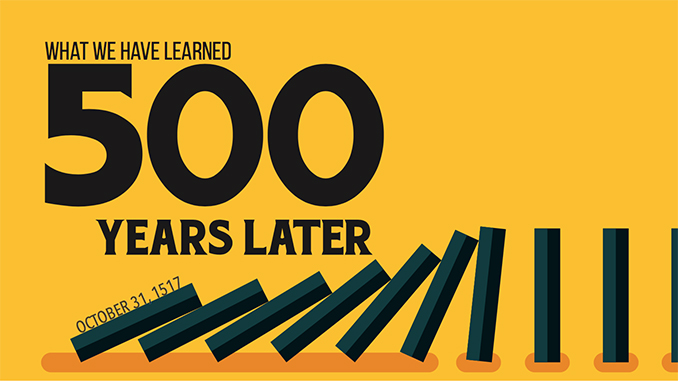
The date is three days following the 9/11 attacks and the setting is the Washington National Cathedral. The country is searching for some form of comfort. The strains of “A Mighty Fortress Is Our God” could be heard drifting through the portals of the gigantic cathedral. It was part of the National Service of Prayer and Remembrance.
I have spent my entire adult life planting churches in the land of Martin Luther, the reformer who penned that hymn, the man who found comfort in a personal God who cares. Living and ministering in Germany so long has provided me a perspective on this culture, I have learned to love these people – I know this culture by immersion. The following is my take on the lasting effects of the Reformation, 500 years downstream.
Even our city of ministry, Aschaffenburg, located a 30-minute drive east of Frankfurt, where we have planted a strong, viable church, played a trivial role in the reformation. It was here in this city on the river Main, that Luther’s direct boss, Albrecht von Brandenburg, resided. Luther had a copy of the 95 theses sent to his direct report. Albrecht, who held little desire to be a theologian, forwarded them on to Rome and the Pope. Albrecht later died in Aschaffenburg on September 24, 1545.
“On All Hallows’ Eve, October 31, 1517, the Roman Church received the world’s most memorable trick-or-treater at its door — though barely noticed at the time — when a lowly priest named Martin Luther approached the threshold of the Wittenberg branch in Germany and posted his 95 measly theses (they aren’t nearly as impressive as you would expect). The coming All Saints’ Day seemed like an excuse for sparring about the Church’s deplorable sanctioning of indulgences, and Luther was angling for some good-spirited debate.” David Mathis, Executive Editor, desiringGod.org
Reforms do not stay reformed
Reforming is a common struggle. Do you have an unused membership to a fitness club – even when you pay the monthly subscription and are convinced of the benefits? What likelihood would you give Congress in bringing health care reform? University of Scranton research suggests that just 8% of people achieve their New Year’s goals and, according to a U.S. News study, approximately 80% of resolutions fail by the second week of February. In other words, lasting reform is difficult at best. Germany is a prime example.
Lasting effects of the Reformation
- In Germany, Lutherans are 27.1% of the population. It is one of the two state churches – there is no separation between church and state in this culture.
- The German-speaking world has a reliable Bible in its own language.
- The publication of the Bible in German unified a common language. Prior to Luther’s Bible, Germany was fractured in regional dialects. This influence cannot be overstated. Much of present-day appreciation for Luther has less to do with his theology than for his cultural and social impact.
- Sola Scriptura
Following Luther’s initial translation in 1522, an estimated 5,000 copies were sold in two months. The Bible was an instant bestseller, the must-have book to read at the time of its publication.Most important, the Bible left a permanent impression on a great translator of the English Bible. William Tyndale, one of the Reformation’s champions, had fled from England to the Continent about the time Luther was publishing his German New Testament. He too was translating from the original manuscripts, and possibly he and Luther met in Wittenberg.Luther’s strong influence on the father of the English Bible is unmistakable. Since Tyndale’s English translation makes up more than 90 percent of the King James New Testament, Luther’s legacy is clearly visible.”It is not possible to reproduce a foreign idiom in one’s native tongue,” Luther wrote. “The proper method of translation is to select the most fitting terms according to the usage of the language adopted. To translate properly is to render the spirit of a foreign language into our own idiom. I try to speak as men do in the marketplace. In rendering Moses, I make him so German that no one would suspect he was a Jew.”
- Study resources
Every serious student of scripture will have access to language and historical reference materials. Many of the authoritative resources are from German authors, so thorough and reliable in their research. Among them would be Keil and Delitsch, as well as Kittel’s Theological Dictionary of the New Testament.
- Biblical Archeology
In 1864 or 1865 the German engineer Carl Humann was charged with the geographical investigation and excavation of acropolis ruins in the ancient city of Pergamon. In 1878 the German government acquired a license to dig in Turkey. The temple described by the apostle John as being the seat of Satan was removed in its entirety to Berlin. Since the beginning of the 20th century, museum visitors can visit this temple on exhibit (although museum renovations have this section off-limits until it reopens in 2019). Additionally, the processional walls of Babylon seen by Daniel, buildings from Ninevah seen by Jonah, the marketplace of Milet – where Paul met with the church leaders of Ephesus are a must-see stop when visiting the reunified capital of Germany.
There was a time when the Scriptures had great significance in Germany.
Then entered philosophy (for example, Friedrich Nietzsche) and the influence of a new field: science. At the end of the 19th century, new thought questioned the veracity of Scripture and a widespread doubt seeped its way into mainstream society. The Modern age was born where truth is determined logically via what can be observed. The telescope and microscope became the go-to source for answers.
With Scripture undermined and human logic the guide, theologians were swept into the popular decision to question anything that did not make common sense, so even the bedrock of the Gospel message would be renegotiated and redefined. The background was now set for a dictator to sweep into power – it was no longer assured that every soul was created in the image of God. Fifty million people would die as a result of World War II.
The drift of not holding to the Reformation
Modern Germany rose from the literal ashes of 1945 alongside assistance of allies and the Marshall plan, yet has struggled to find any major motivation to turn God-ward.
- The influence of a divided Germany
In the former East Germany, 85% of people have no religion. In 1950, 90% of people claimed Christianity. At the fall of the iron curtain in 1989, 30% were Christian and 70% had no religion.
“The Protestant state church is fairly dead. The percent of committed Christians in Germany is maybe at 3 or 4 percent. Eighty percent belong to a church nominally, Protestant or Catholic. A mere 0.5 percent belong to a free evangelical church. The percent of people believing in life after death is fewer than 50 percent.” Sarah Pulliam Bailey, http://www.christianitytoday.com, November 9, 2009
From Sarah Pulliam Bailey’s interview of a Lutheran pastor:
Question: “The 500th anniversary of Martin Luther’s 95 theses is coming up in 2017. Do you think that will spark any renewal or interest in the church?
Reply: No. When did an anniversary spark anything? Two hundred years of Jonathan Edward preaching. Wow. Let’s have another revival. I don’t think so.
It’ll be just another celebration. But who will remember the real Luther? Luther was rude, Luther was a revolutionary, Luther was a punk. The church leaders in Germany are so unlike Luther. The current mainline Protestant church is the opposite of Luther. Luther would have driven most of our bishops from their pulpits.“
- The impact of affluence
Germany has a great system for developing intellectual talent. University study is paid by the government, but is only available to an elite group – and that selection is decided by the fourth, yes fourth, grade. As a result, “Made in Germany” has become a worldwide branding reputation that equals high quality. Exports have allowed Germany to produce 25% of the entire Gross Domestic Production of Europe.
This has brought a higher salary for workers and the standard of living is very high. Being a socialistic society, taxes are extremely high, even if income tax is not the highest. Sales taxes are 19% along with an incredibly long list of other ways to tax people: TV and radio tax, road taxes, energy tax ….
That has also had a trickle-down effect – millennials are waiting longer and longer to establish families. Two income families are the norm. One of the ways that many are lowering their tax burden is to leave the rolls of church membership, since “donations” are deducted from wages and given to the church. Over 300,000 are unregistering from the state church annually. This disconnect is difficult to surmount, once established.
This is one of the dangers of affluence and a challenge for the European church planter. General spiritual disconnect or apathy is prevalent.
- General discontent
The German news magazine Spiegel published a widespread study of the average German, revealing interesting aspects…
“The radio will be on, day after day, and so will the TV – for at least three hours a day – and the message it will convey to viewers is that some people make 1,000 times as much money as they do, that their lives are 1,000 times as exciting, even though they cannot possibly be working 1,000 times as much.”
Another edition of Spiegel quotes a study:
“During the course of the study, the researchers managed to unlock a typically German sequence of steps to enjoyment, which they named “pleasure DNA.” The first step involves the feeling of having earned something. This is followed by preparation for the longed-for pleasure, such as booking a day of wellness treatments. But then comes the biggest hurdle: letting go and clearing the mind.”
“Many Germans apparently lack crucial components to this “pleasure DNA.” Though some 91% of the study participants said that pleasure makes life worthwhile, only 15% could recall moments in which they were able to forget their worries and feel truly happy.”
Absence from work due to depression has increased almost 70% in Germany from 2000 to 2013.
Could it be that this postmodern spiritual disconnect has lasting pragmatic consequences? Augustine stated: You have made us for yourself, O Lord, and our heart is restless until it rests in you.”
In closing, history is not isolated to another cultural group, in this case Germans – everyone is in danger of drifting from essentials. We would do well to reaffirm the Solas of the Reformation: By faith alone, by Scripture alone, Christ alone, alone by grace, alone to God’s glory. We are witnessing a societal shift, we would be wise to continually reassess where our culture is negatively impacting our walk with Christ. Indeed, a mighty fortress is our God. And in times of uncertainty as these, it is a good reminder.



